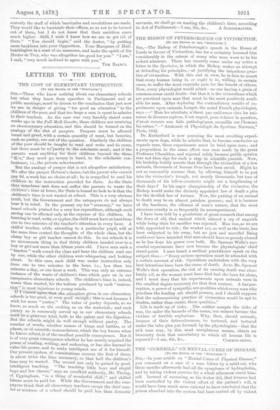LETTERS TO THE EDITOR.
THE COST OF ELEMENTARY INSTRUCTION. (To THE EDITOR OF THE "SPECTATOR.")
Sm.—Those who know nothing about our elementary schools but what they learn from speeches in Parliament and at public meetings, must be driven to the conclusion that just now we are in danger of giving "too good an education" to the children of the poor, and that too large a sum is spent in salaries to their teachers. As the case was very forcibly stated some
weeks ago in the Pall Mall Gazette, these children are receiving an eleemosynary education, and this should be framed on the analogy of the diet of paupers. Paupers must be allowed bread and gruel, with a certain quantity of meat, but luxuries, such as pastry, are out of the question. Similarly the children of the poor should be taught to read and write and do sums, but there must be no•pastry in the scholastic meal ; and if the parents want anything for their children beyond the three " R.'s," they must go, money in hand, to the scholastic con- fectioner, i.e., the private schoolmaster.
But the analogy of pauper diet is not altogether satisfactory. We offer the pauper Hobson's choice, but the parent who cannot pay 9d. a week has no choice at all ; he is compelled to send his children to the instruction provided for them. As the State thus interferes and does not suffer the parents to waste the children's time at home, the State is bound to look to it that the children's time is not wasted at school. This is a very obvious truth, but the Government and the ratepayers do not always bear it in mind. In the present cry for "economy," we have heard schools praised for a very 'low expenditure, although such saving can be effected only at the expense of the children. In learning to read, write, or cypher, the child must have at least from one to two minutes of the teacher's attention in every hour. A skilful teacher, while attending to a particular pupil, will at the same time control the thoughts of the whole class, but the cheap boy or girl teacher cannot do this. In our schools it is no uncommon thing to find thirty children handed over to a boy or girl not more than fifteen years old. I have seen such a '
teacher" walk round the class and hear the children read one by one, while the other children were whispering and looking about. In this case, each child was under instruction only from one to two minutes in the hour, i.e., less than ten minutes a day, or one hour a week. This was only an extreme instance of the waste of children's time which goes on in. our inexpensive elementary schools. The children's time is, indeed, worse than wasted, for the tedium produced by such " instruc- tion" is most injurious to young minds.
If I cannot agree that the education given in our elementary schools is too good, or even good enough ; this is not because I wish for more "pastry." The value of pastry depends, as we know, as much on the cooking as on the materials ; and such Pastry as is commonly served up in our elementary schools must be a grievous trial, both to the palate and the digestion. But the schools might do well enough without pastry. The number of words, whether names of kings and battles, or of places, or of scientific nomenclature, which the boy knows when he leaves school, is of the smallest possible consequence. But it is of very great consequence whether he has merely acquired the power of reading, writing, and reckoning, or has also learned to 'value his power, and to make intelligent use of it for himself. Our present system of examinations secures the first of these, in about twice the time necessari, so that half the children's time may be wasted. The second can only be gained by good, intelligent teaching. "The teaching little boys and stupid boys and low classes," says an excellent authority, Mr. Thring, of Uppingham, "is a thing of wonderful skill ;" and skilled labour must be paid for. While the Government and the rate- Payers think that all elementary teachers except the chief mas- ter or mistress of a school should be paid less than domestic servants, we shall go on wasting the children's time, according to Act of Parliament. —I am, A SCHOOLMASTER.


































 Previous page
Previous page